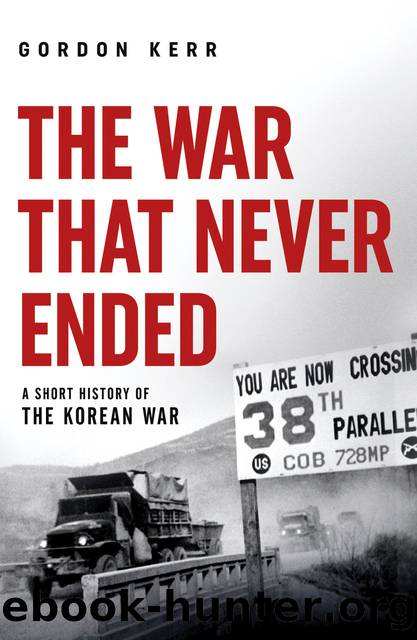The War That Never Ended by Gordon Kerr;

Author:Gordon Kerr;
Language: eng
Format: epub
Publisher: Lightning Source Inc. (Tier 1)
Published: 2020-02-18T17:01:42+00:00
The End for MacArthur
It was inherently distasteful to Americans to be struggling so much to defeat the communists in Asia. They had, after all, just won a global war, using all the technological and military power they could amass, including the use of the ultimate weapon, the atomic bomb. But now, the richest and most powerful country in the world was unable to force her will upon a much weaker enemy and, to make matters worse, American troops were dying in their thousands in the conflict. All of this was anathema to the right wing of the Republican Party that was increasing in influence in the US political arena. They believed that the American military should be allowed to employ its vast technological advantage to bring the war to a conclusion. This meant not excluding the use of nuclear weapons, if that was the only way.
Meanwhile, MacArthur continued to try to exert pressure on the administration. He spoke of large air attacks to isolate North Korea from China and, somewhat implausibly, suggested the establishment of a boundary between the forces of communism and ‘freedom’ by creating a no-man’s-land that was seeded with radioactive waste. Truman, on the other hand, as we have seen, was keen to start talking about a ceasefire. MacArthur, of course, could not accept this and anti-Washington, as well as anti-communist, propaganda began to flow relentlessly from the Dai Ichi. Much of the ire was directed at America’s allies who, to MacArthur’s eyes, were weak and ineffectual. He even drummed up a theory that the British had tried to persuade Washington to give China the seat occupied by Chiang Kai-shek at the United Nations.
The British, for their part, continued to be concerned about MacArthur and were very worried about what he might do. This contributed to the desire in Washington to take action. The British Foreign Secretary, Herbert Morrison (1888-1965), discussed the concern about MacArthur in a cable to the British Ambassador in Washington, Sir Oliver Franks (1905-92):
‘Our principal difficulty is General MacArthur. His policy is different from the policy of the UN. He seems to want a war with China. We do not. It is no exaggeration to say that by his public utterances, he has weakened public confidence in this country and in Western Europe in the quality of American political judgement and leadership. Here we seem to have a case of a commander publicly suggesting that his policy is not the stated policy of his government, not subject to the control of his own government, and whom his own government is, nevertheless, unwilling and unable to discipline.’
Little did he know as he was writing this cable that Truman had already made up his mind that MacArthur had to go. On 5 April, in the House of Representatives, Representative Joe Martin (1884-1968) read a letter he had received from MacArthur in answer to a request from Martin that the general comment upon the idea of allowing Chiang’s troops to land on mainland China. MacArthur had
Download
This site does not store any files on its server. We only index and link to content provided by other sites. Please contact the content providers to delete copyright contents if any and email us, we'll remove relevant links or contents immediately.
| Africa | Americas |
| Arctic & Antarctica | Asia |
| Australia & Oceania | Europe |
| Middle East | Russia |
| United States | World |
| Ancient Civilizations | Military |
| Historical Study & Educational Resources |
Empire of the Sikhs by Patwant Singh(23064)
The Wind in My Hair by Masih Alinejad(5082)
Rise and Kill First by Ronen Bergman(4766)
The Templars by Dan Jones(4676)
The Rape of Nanking by Iris Chang(4193)
12 Strong by Doug Stanton(3541)
Blood and Sand by Alex Von Tunzelmann(3184)
Babylon's Ark by Lawrence Anthony(2666)
The History of Jihad: From Muhammad to ISIS by Spencer Robert(2614)
No Room for Small Dreams by Shimon Peres(2355)
The Turkish Psychedelic Explosion by Daniel Spicer(2349)
Inside the Middle East by Avi Melamed(2347)
Gideon's Spies: The Secret History of the Mossad by Gordon Thomas(2329)
Arabs by Eugene Rogan(2291)
The First Muslim The Story of Muhammad by Lesley Hazleton(2257)
Come, Tell Me How You Live by Mallowan Agatha Christie(2244)
Bus on Jaffa Road by Mike Kelly(2144)
1453 by Roger Crowley(2018)
Kabul 1841-42: Battle Story by Edmund Yorke(2014)
